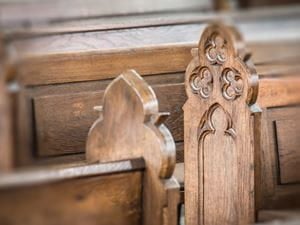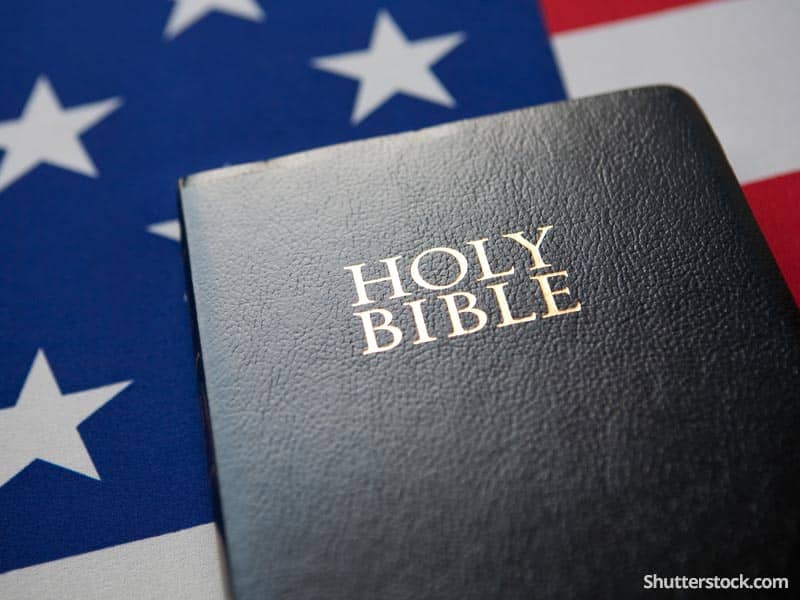
When it comes to the level of influence religion should play in politics and government policies, there is little consensus. People who are unaffiliated with a religion tend to see religious influence as excessive, while those who identify with particular faiths are more inclined to regard religion as having either the right amount of influence or too little. While many people believe that their faith drives their politics, there is evidence that shows that it may be the opposite – that politics and partisanship drives religious attitudes.
In the Gallup article “Religion Remains a Strong Marker of Political Identity in U.S.,” author Frank Newport explains that even as overall party identification trends in the U.S. have shifted over the years, the relationship between religion and party identification have remained consistent. Americans who are very religious more often than not lean toward the Republican Party and less frequently identify with or lean towards the Democratic Party, compared with those who are either moderately religious or nonreligious. Gallup classifies Americans as “very religious” if they say religion is an important part of their daily lives and they attend religious services every week or almost every week.
In a NY Times op-ed, Michele Margolis, the author of “From Politics to the Pews: How Partisanship and the Political Environment Shape Religious Identity” she explains that our religious beliefs not only affect our politics, but that our politics affect our religious choices. Margolis says, “We don’t just take cues about politics from our pastors and priests; we take cues about religion from our politicians.” She also discusses that as recently as the 1970s, white Republicans were no more religious than white Democrats. However, the religious landscape and religiosity gap has changed where today, nearly 20 percent are more likely to go to church regularly and likewise about 20 percent more likely to believe in God. These statistics point to the fact that politics plays a pretty big part in determining religious beliefs. Here are four ways partisanship drives religious attitudes.
Most Americans choose a political party before choosing a religious community.
Margolis explains that faith often becomes a peripheral concern in adolescence and young adulthood during the same years we tend to form stable partisan attachments. Religion typically becomes relevant again later after we have children and start to think about their religious upbringings. At this time, our political views are generally set, ready to guide our religious values and decisions. This is the same patterns that produced the religiosity gap between Democrats and Republicans.
The changing political landscape of the 70s and 80s increased focus on morality and faith.
Since the 1980s, evangelicals have played a key Republican voting bloc in presidential elections. However, this active political engagement and strong Republican partisanship is relatively new, and it covers the smaller, but still substantial minority of evangelicals who align with Democrats. In order to understand the contemporary context, you have to look at the roots of evangelical political activism.
In the 1970s, evangelicals tended to support Democrats. Jimmy Carter’s presidential campaign in 1976 connected well with evangelicals who were growing more active on individual political issues but were not particularly active in party politics. Carter, a Southern Baptist Sunday School teacher often spoke about his faith and described himself as “born again.” During Carter’s presidency, evangelical support started moving toward the Republicans after Roe v. Wade, as they saw the importance of the abortion issue and its connection to central Christian teachings. When the 1980 presidential election came up, abortion was a centerpiece of Christian Right politics.
Ronald Reagan’s campaign and the Republican Party recognized the importance of evangelical voters and actively sought their support. Beginning in 1980, the Republican platform included planks supporting organized prayer in public schools and defining human life as beginning at conception. The party also began embracing the term “pro-family” to describe its agenda. Evangelical voters responded to this, providing strong support for Reagan in 1980 and 1984. By the end of the 1980s, evangelical voters had become an essential part of the Republican base. Republican candidates and party leaders actively went after evangelical voters, crafting issue appeals to win their support.
The relationship between Americans’ religiousness is persistent and a well-documented social pattern.
Newport writes that the relationship between religiosity and party identification in the U.S. has been both constant across time and most demographic groups within the population, including age, gender, religion and socio-economic status. Within those categories, Americans who are the most religious are the most likely to be Democratic. However, one exception to the basic religiousness and party identification relationship occurs among black Americans, who tend to be the most Democratic of any major race and ethnic group measured. Black Americans tend to be very religious, but the political orientation of blacks who are nonreligious does not vary significantly from those who are very religious.
President Trump’s polarizing presidency could be changing evangelicalism in America.
In Margolis’ opinion piece, she talks about religious identity in the age of Donald Trump. While there is often the narrative that religious beliefs lead white evangelicals to the Republican Party, she discusses how this narrative ignores the flips side – that President Trump’s polarizing presidency could be changing evangelicals in America. Margalois explains, “Hearing evangelical leaders praise Mr. Trump and noting his persistent approval among white evangelicals, white Trump supporters may find themselves more and more drawn to the evangelical label and to churches they know will be filled with politically like-minded congregants. And “Never Trumpers” – especially those raising children – may refuse to embrace the evangelical label and search for churches more in line with their politics.” Those engaged in politics are looking for religious communities where their political beliefs, particularly around religious morals and values are shared.
Religion is important for American politics because religion is important for Americans. Statistics show that the U.S. is extraordinarily high on religion for a developed country. Yet, there are factors in American political life that amplify the role of religion in a way that is not seen in other developed countries. Contrary to the popular belief, politics can play a pretty big role in people’s religious attitudes and beliefs.

